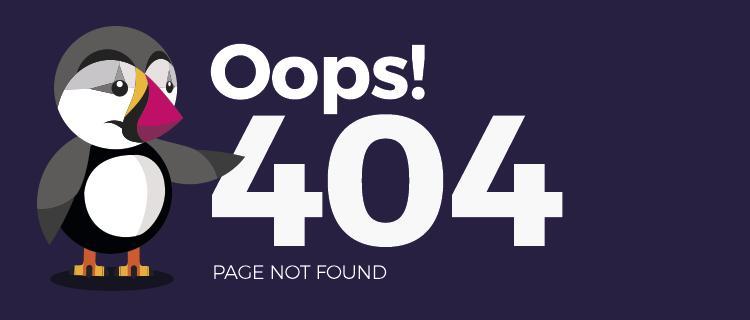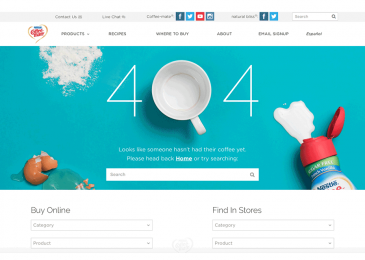Search engines, such as Google and Bing, will have a negative impression of a site if it has many 404 errors. Once the crawlers have established that many requests are being met with 404 codes, it presumes the site isn’t very well maintained. Dead links affect a site’s ranking and Google can decrease its placement in the SERPs or even stop indexing it if there are too many 404 error pages occurring. This may result in a considerable decrease in visitor numbers for the website.
Identifing 404 errors on your own website
It’s important for website operators to prevent HTTP 404 pages. This applies to internal 404 error pages on their own website as well as external 404 error pages on other sites. There are numerous free tools available to help you find these broken links more easily. Three of the best and most well-known are:
- Google Search Console (formerly known as ‘Google Webmaster Tools’): if you already have a Google account and have registered your website there, you should make use of the Google Search Console option. Any 404 errors found by the Google crawler are displayed in the web tool and can also be marked as corrected here too. Additional functions enable you to find errors in robots.txt files and use crawling statistics to work out how often your site has been crawled by Google crawlers.
- Dead Link Checker: one of the simplest and fastest tools for finding both internally and externally linked 404 pages is the Dead Link Checker. With this web app you simply enter the URL of the site you want to inspect and then start the check. Here you have the choice of checking a single web page or a whole site. The app lists all the tracked error pages with status codes and URL.
- W3C Link Checker: this online tool from World Wide Web Consortium (W3C) is particularly detailed when it comes to testing individual website pages, so the process takes longer to verify links than with other websites. The W3C Link Checker works just like the Dead Link Checker: you enter the URL and let the tool do the rest. It’s also possible to add further details
How to fix it
A 404 error is rarely a reason to celebrate. At the end of the day, the website’s visitors have not found the content that they were looking for. However the appearance of a 404 page does not necessarily mean that the desired information is not available at all. In many cases, the solution to the original error is easily foundand the visitor can be quickly directed to the web page that they were originally looking for. So how exactly can you go about achieving a 404 error fix? Our advice would be to try out these potential solutions (in the order that they are listed):
- Reload the page: It might be that the error 404 has appeared for the simple reason that the page did not load properly. This can be checked quite easily by clicking on the ‘Refresh’ button in your browser or also by pressing the F5 button.
- Check the URL: Regardless of whether you have entered the URL address manually or been directed via a link, could be that a mistake has been made. For this reason you should check the specified path of the website. It could be that either you, or the person who entered the link, has mistyped something. Apart from spelling mistakes, it could also be that forward slashes have been left out or misplaced. But bear in mind that this can only really be checked with ‘clean’ URLs, as they contain unreadable words instead of incomprehensible abbreviations, letters, numbers, and symbols.
- Go back through the directory levels: For example, if a URL of the following structure example.com/Directory1/Directory2/Directory3 causes a 404 error page, then you can always go back to the previous directory level (in this example: example.com/Directory1/Directory2) in order to check whether the desired page is linked there. All you need to do is clear the last directory in the URL. The link for the page you are looking for should be visible on the previous page. If it is not to be found on that page then you can also go back to the previous page and look for the correct link there. But if it so happens that this method is also successful and you eventually end up back on the homepage, then move onto the next tip.
- Use the website’s search function: Many websites offer a search function as part of their homepage. By entering one or several keywords, it can help you find the specific page that you are looking for.
- Use a search engine: You also have the possibility of using the website of your choice to find a website. As long as the desired site exists, you should be able to find it by entering the website domain and/or a keyword transcription of the subject matter.
- Delete the browser cache and cookies: Ifyou can access the website from another device, and the HTTP 404 error only seems to appear on a certain computer, then the problem could lie with your browser. Therefore you should delete the browser cache as well as all cookies for this site, and this may then finally allow you to access the page.
- Contact the website: If none of the abovementioned tips have been successful then the only remaining option may be to get in touch with the person/people responsible for the website. Contact information can usually be found in the website’s masthead or else on a specific ‘Contact Us’ page. The operators of the website should be able to provide information as to whether the page you are looking for actually exists. It might be the case that the page in question has been moved to a new URL, and in this scenario you will be doing the website operator a big favor. They can then carry out a 404 error fix by introducing a domain redirect, which will automatically direct users from the old web page to the current one.
Read more How can you create a good 404 page?
_______________________________________________________________________________
For more details about our seo service packages, pls contact us
BIGBIGSEO Team
Email: bigbigseo@gmail.com
Skype: bigbigseo
https://www.facebook.com/bigbigseo
Thank you!





